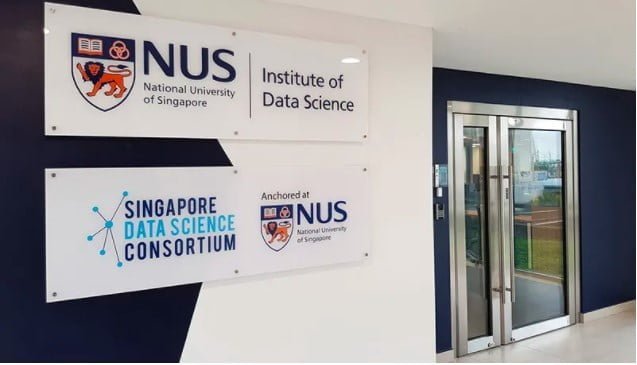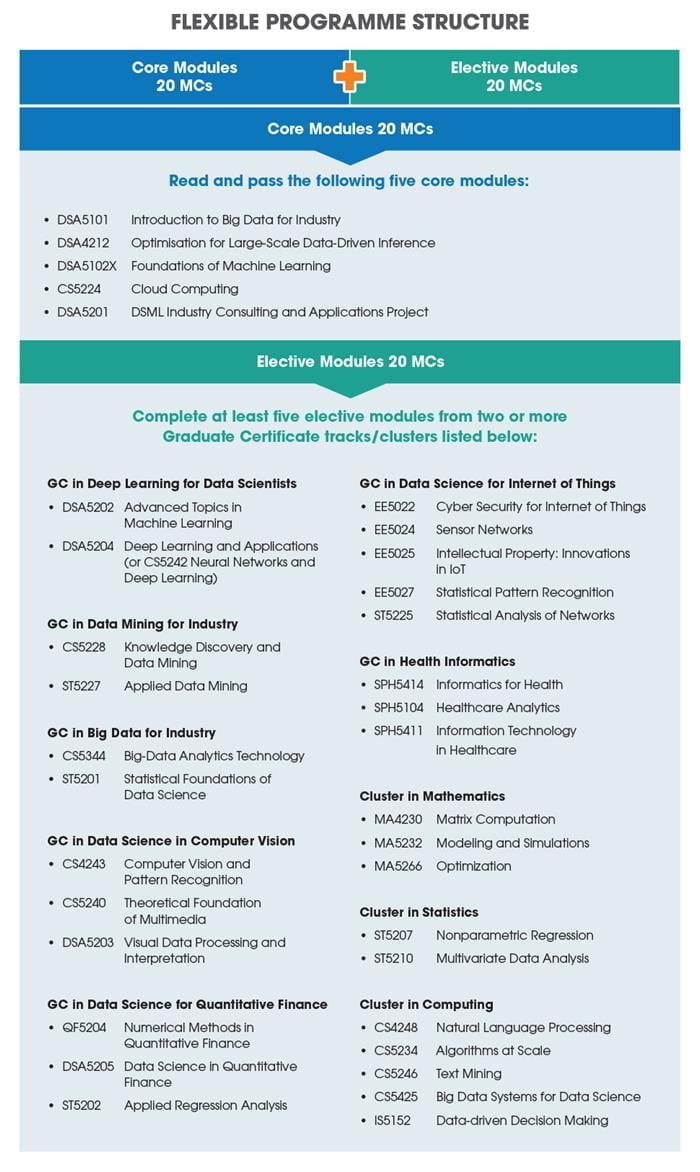The National University of Singapore (NUS) Master of Science (MSc) in Data Science and Machine Learning programme has only one intake per year, and is accepting applications for the August 2021 intake until 31 January 2021.

Professo Zhang Louxin
Academic Director
Master of Science in Data Science and Machine Learning Programme
National University of Singapore
“The data revolution is on the rise. Are you ready? If you wish to put your talents to good use and further improve our living environment with machine learning and data science, come and join our team. ” —— Message from the Academic Director
Data science is an intelligent discipline that collects, models and analyses data and experience to extract useful information. This information may improve our lives or help us make well-informed business decisions or public policy.
The NUS MSc in Data Science and Machine Learning programme has the advantage of balancing theory with practice to cultivate talent for the industry. The programme offers multiple data science specialisations and strong faculty support. In addition, because Singapore attaches great importance to the development of digital and intelligent cities, the programme is able to make the most of opportunities in the city state to offer internships.
Graduates of the programme will have great job prospects. There is a growing demand for data science practitioners in government departments, large businesses and the consumer goods sector. Meanwhile, the move towards digital and smart cities is providing more and more employment opportunities in the field of data science.

The NUS MSc in Data Science and Machine Learning programme is jointly offered by the Faculty of Science’s Department of Mathematics, Department of Statistics and Applied Probability, and Department of Computer Science. It also receives strong teaching support from the Faculty of Engineering and the Saw Swee Hock School of Public Health. The programme has brought together the best academic and research expertise in NUS to design and deliver a top-notch curriculum.
In the QS World University Rankings (NUS) by Subject 2020, the National University of Singapore ranked 13th in Mathematics, 11th in Statistics and Operational Research, 12th in Computer Science and Information Systems, 10th in Engineering and Technology, and No.1 in Asia in Life Sciences and Medicine.
In addition, the Institute of Data Science (IDS), founded in 2016, combines multiple data science specialisations to enable the development of innovative solutions from all angles. IDS collaborates with industries, governments, communities and education institutions to leverage data science expertise for interdisciplinary and transformational research on critical real-world issues, and works to train the next generation of data scientists.
Students in the MSc in Data Science and Machine Learning programme will have opportunities to learn from IDS experts (some of whom act as faculty for the programme) and to participate in IDS projects. The IDS also offers PhD programmes in data science for further studies.

The curriculum of MSc in Data Science and Machine Learning programme is composed of 40 modular credits (MCs) in total, with Core modules and Elective modules each accounting for 20 MCs.

▲Programme structure
The five core modules are:
They introduce basic theory and common software tools in data science and machine learning. For example, module DSA5101 covers various topics in data analysis, such as data cleansing and data visualisation. It also covers Python programming, including Django.
Module DSA5201 requires students to take up real-world data analysis projects in enterprises or to join a scientific research group for research. The minimum duration of an internship is 10 weeks (15 hours per week) and the enterprise can be based in Singapore or overseas.
The elective modules focus on practical issues in data analysis from different industries. Students are expected to complete at least five elective modules from two or more of the Graduate Certificate (GC) tracks or Clusters listed below:
Practitioners working in data science, such as data analysts, data engineers, and data scientists, must understand the business models and products of the enterprise they work for.
The elective module clusters are closely linked to the future employment goals of students. Their multiple specialisations also help broaden student knowledge and support their work in a variety of sectors in the future.

Data scientist and/or data engineer appear among the top 15 jobs of the future in LinkedIn’s 2020 Emerging Jobs Report across a number of countries, including Indonesia, Malaysia, the Philippines, Singapore, Thailand, and the United States of America. The 2019 Emerging Jobs Report (China) also ranks data analyst as one of the top five emerging jobs, and points out that most of China’s data analysts used to be technicians or researchers who have made a career switch. This data indicates a growing demand for professional data analysts in the future.
Data science practitioners are highly sought after by many employers. Such positions include Artificial Intelligence Specialist, Data Scientist, Data Engineer, Data Analyst, Big Data Engineer, Big Data Systems Architect, Data Mining Engineer, Data Analytics Specialist, Data Visualisation Developer, Hadoop Developer/Engineer, Machine Learning Engineer, Machine Learning Scientist, Cyber Data Scientist, Statistician, Biostatistician, Business Analyst, Intelligence Analyst, Risk Analyst, Pricing Analyst, Audience Insights Analyst, Market Research Analyst, Credit Risk Modelling Analyst, Financial Analytics Specialist, Human Capital Analytics Specialist, Quality Assurance Officer, Actuary and Researcher.
Technology enables access to a vast array of data from individuals, businesses, governments, social and natural sciences, and medicine, amongst other fields. The data in turn provide insights into economic growth, social security, scientific discovery and improvements in quality of life. The role of data science in key decision-making processes is becoming increasingly prominent.
Join the NUS MSc in Data Science and Machine Learning programme and take a powerful step towards key positions in our future society.

To apply for admission to the NUS MSc in Data Science and Machine Learning programme, applicants should possess a Bachelor’s Degree (with Honours) or a four-year Bachelor’s Degree in quantitative science (mathematics, applied mathematics, computational mathematics, statistics and physics) or engineering or computer science. The programme also accepts outstanding applicants with a degree in finance or medicine, which covers quantitative science.
Applicants whose medium of university instruction was not English are required to demonstrate their English proficiency by achieving a Test of English as a Foreign Language (TOEFL) minimum score of 580 (paper-based) or 85 (Internet-based), or an International English Language Testing System (IELTS) minimum academic score of 6.0.
PROGRAMME CANDIDATURE
Students are likely to take between 12 and 24 months to complete the programme on a full-time basis and 24 to 48 months on a part-time basis.